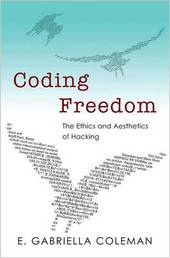
|
Coding Freedom: The Ethics and Aesthetics of Hacking
Paperback / softback
Main Details
| Title |
Coding Freedom: The Ethics and Aesthetics of Hacking
|
| Authors and Contributors |
By (author) E. Gabriella Coleman
|
| Physical Properties |
| Format:Paperback / softback | | Pages:272 | | Dimensions(mm): Height 235,Width 152 |
|
| Category/Genre | Ethics and moral philosophy |
|---|
| ISBN/Barcode |
9780691144610
|
| Classifications | Dewey:323.445 |
|---|
| Audience | | Tertiary Education (US: College) | | Professional & Vocational | |
|---|
| Illustrations |
12 halftones.
|
|
Publishing Details |
| Publisher |
Princeton University Press
|
| Imprint |
Princeton University Press
|
| Publication Date |
2 December 2012 |
| Publication Country |
United States
|
Description
Who are computer hackers? What is free software? And what does the emergence of a community dedicated to the production of free and open source software--and to hacking as a technical, aesthetic, and moral project--reveal about the values of contemporary liberalism? Exploring the rise and political significance of the free and open source software (F/OSS) movement in the United States and Europe, Coding Freedom details the ethics behind hackers' devotion to F/OSS, the social codes that guide its production, and the political struggles through which hackers question the scope and direction of copyright and patent law. In telling the story of the F/OSS movement, the book unfolds a broader narrative involving computing, the politics of access, and intellectual property. E. Gabriella Coleman tracks the ways in which hackers collaborate and examines passionate manifestos, hacker humor, free software project governance, and festive hacker conferences. Looking at the ways that hackers sustain their productive freedom, Coleman shows that these activists, driven by a commitment to their work, reformulate key ideals including free speech, transparency, and meritocracy, and refuse restrictive intellectual protections. Coleman demonstrates how hacking, so often marginalized or misunderstood, sheds light on the continuing relevance of liberalism in online collaboration.
Author Biography
E. Gabriella Coleman is the Wolfe Chair in Scientific and Technological Literacy in the Department of Art History and Communication Studies at McGill University.
Reviews"Coding Freedom is insightful and fascinating, a superbly observed picture of the motives, divisions and history of the free software and software freedom world."--Cory Doctorow, BoingBoing "Anyone who thinks about programmers, open source, online communities, or the politics of intellectual property should have a copy of Coding Freedom on the shelf. It is an invaluable portrait of how free-software coders work, individually and collectively."--James Grimmelmann, Jotwell "The hacker ethic may be peculiar to outsiders. But it stems from a deep commitment to justice, fairness, and freedom. Anthropologist Gabriella Coleman describes in her phenomenal book Coding Freedom how hacker ethic gets encoded into both technical and political practice."--Danah Boyd, Wired "Though occasionally she uses academic jargon, her book is an intriguing read and connects the dots... Reading this book will help you to understand the conflict, as well as hacker culture."--David Hutchinson, io9.com "[S]triking and important... Coleman has captured a great deal of the essential spirit of the free- and open-software movement... I strongly suggest that you buy a copy of the book."--John Gilbey, Times Higher Education "[I]t is well-written and the analyses really get to the heart of some deeply ethical questions about individual, group and political relationships in voluntary groups which are rarely considered in such detail."--John R. Hudson, Briefing Bradford "This work by Coleman is at once history, ethnography, cultural criticism, and storytelling... Once can read the book as a narrative of the free software and open source movements, or as a sympathetic description of the behavior norms of hackers... Some readers will likely not consider hackers' aesthetic appreciation of good or clever coding as beauty, nor hackers' humor as funny, but these are Coleman's courageous attempts to provide a rounded depiction of this subculture. This book seems likely to be one of the defining works of cultural anthropology."--Choice
|